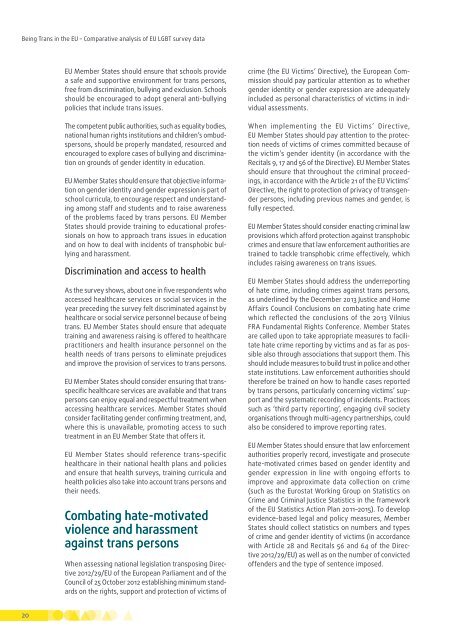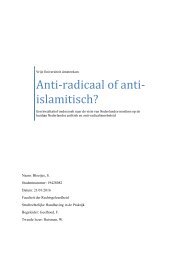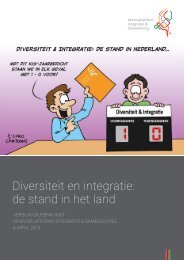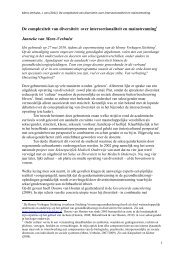fra-2014-being-trans-eu-comparative_en
fra-2014-being-trans-eu-comparative_en
fra-2014-being-trans-eu-comparative_en
You also want an ePaper? Increase the reach of your titles
YUMPU automatically turns print PDFs into web optimized ePapers that Google loves.
Being Trans in the EU – Comparative analysis of EU LGBT survey dataEU Member States should <strong>en</strong>sure that schools providea safe and supportive <strong>en</strong>vironm<strong>en</strong>t for <strong>trans</strong> persons,free from discrimination, bullying and exclusion. Schoolsshould be <strong>en</strong>couraged to adopt g<strong>en</strong>eral anti-bullyingpolicies that include <strong>trans</strong> issues.The compet<strong>en</strong>t public authorities, such as equality bodies,national human rights institutions and childr<strong>en</strong>’s ombudspersons,should be properly mandated, resourced and<strong>en</strong>couraged to explore cases of bullying and discriminationon grounds of g<strong>en</strong>der id<strong>en</strong>tity in education.EU Member States should <strong>en</strong>sure that objective informationon g<strong>en</strong>der id<strong>en</strong>tity and g<strong>en</strong>der expression is part ofschool curricula, to <strong>en</strong>courage respect and understandingamong staff and stud<strong>en</strong>ts and to raise awar<strong>en</strong>essof the problems faced by <strong>trans</strong> persons. EU MemberStates should provide training to educational professionalson how to approach <strong>trans</strong> issues in educationand on how to deal with incid<strong>en</strong>ts of <strong>trans</strong>phobic bullyingand harassm<strong>en</strong>t.Discrimination and access to healthAs the survey shows, about one in five respond<strong>en</strong>ts whoaccessed healthcare services or social services in theyear preceding the survey felt discriminated against byhealthcare or social service personnel because of <strong>being</strong><strong>trans</strong>. EU Member States should <strong>en</strong>sure that adequatetraining and awar<strong>en</strong>ess raising is offered to healthcarepractitioners and health insurance personnel on thehealth needs of <strong>trans</strong> persons to eliminate prejudicesand improve the provision of services to <strong>trans</strong> persons.EU Member States should consider <strong>en</strong>suring that <strong>trans</strong>specifichealthcare services are available and that <strong>trans</strong>persons can <strong>en</strong>joy equal and respectful treatm<strong>en</strong>t wh<strong>en</strong>accessing healthcare services. Member States shouldconsider facilitating g<strong>en</strong>der confirming treatm<strong>en</strong>t, and,where this is unavailable, promoting access to suchtreatm<strong>en</strong>t in an EU Member State that offers it.EU Member States should refer<strong>en</strong>ce <strong>trans</strong>-specifichealthcare in their national health plans and policiesand <strong>en</strong>sure that health surveys, training curricula andhealth policies also take into account <strong>trans</strong> persons andtheir needs.Combating hate-motivatedviol<strong>en</strong>ce and harassm<strong>en</strong>tagainst <strong>trans</strong> personsWh<strong>en</strong> assessing national legislation <strong>trans</strong>posing Directive2012/29/EU of the European Parliam<strong>en</strong>t and of theCouncil of 25 October 2012 establishing minimum standardson the rights, support and protection of victims ofcrime (the EU Victims’ Directive), the European Commissionshould pay particular att<strong>en</strong>tion as to whetherg<strong>en</strong>der id<strong>en</strong>tity or g<strong>en</strong>der expression are adequatelyincluded as personal characteristics of victims in individualassessm<strong>en</strong>ts.Wh<strong>en</strong> implem<strong>en</strong>ting the EU Victims’ Directive,EU Member States should pay att<strong>en</strong>tion to the protectionneeds of victims of crimes committed because ofthe victim’s g<strong>en</strong>der id<strong>en</strong>tity (in accordance with theRecitals 9, 17 and 56 of the Directive). EU Member Statesshould <strong>en</strong>sure that throughout the criminal proceedings,in accordance with the Article 21 of the EU Victims’Directive, the right to protection of privacy of <strong>trans</strong>g<strong>en</strong>derpersons, including previous names and g<strong>en</strong>der, isfully respected.EU Member States should consider <strong>en</strong>acting criminal lawprovisions which afford protection against <strong>trans</strong>phobiccrimes and <strong>en</strong>sure that law <strong>en</strong>forcem<strong>en</strong>t authorities aretrained to tackle <strong>trans</strong>phobic crime effectively, whichincludes raising awar<strong>en</strong>ess on <strong>trans</strong> issues.EU Member States should address the underreportingof hate crime, including crimes against <strong>trans</strong> persons,as underlined by the December 2013 Justice and HomeAffairs Council Conclusions on combating hate crimewhich reflected the conclusions of the 2013 VilniusFRA Fundam<strong>en</strong>tal Rights Confer<strong>en</strong>ce. Member Statesare called upon to take appropriate measures to facilitatehate crime reporting by victims and as far as possiblealso through associations that support them. Thisshould include measures to build trust in police and otherstate institutions. Law <strong>en</strong>forcem<strong>en</strong>t authorities shouldtherefore be trained on how to handle cases reportedby <strong>trans</strong> persons, particularly concerning victims’ supportand the systematic recording of incid<strong>en</strong>ts. Practicessuch as ‘third party reporting’, <strong>en</strong>gaging civil societyorganisations through multi-ag<strong>en</strong>cy partnerships, couldalso be considered to improve reporting rates.EU Member States should <strong>en</strong>sure that law <strong>en</strong>forcem<strong>en</strong>tauthorities properly record, investigate and prosecutehate-motivated crimes based on g<strong>en</strong>der id<strong>en</strong>tity andg<strong>en</strong>der expression in line with ongoing efforts toimprove and approximate data collection on crime(such as the Eurostat Working Group on Statistics onCrime and Criminal Justice Statistics in the <strong>fra</strong>meworkof the EU Statistics Action Plan 2011–2015). To developevid<strong>en</strong>ce-based legal and policy measures, MemberStates should collect statistics on numbers and typesof crime and g<strong>en</strong>der id<strong>en</strong>tity of victims (in accordancewith Article 28 and Recitals 56 and 64 of the Directive2012/29/EU) as well as on the number of convictedoff<strong>en</strong>ders and the type of s<strong>en</strong>t<strong>en</strong>ce imposed.20









